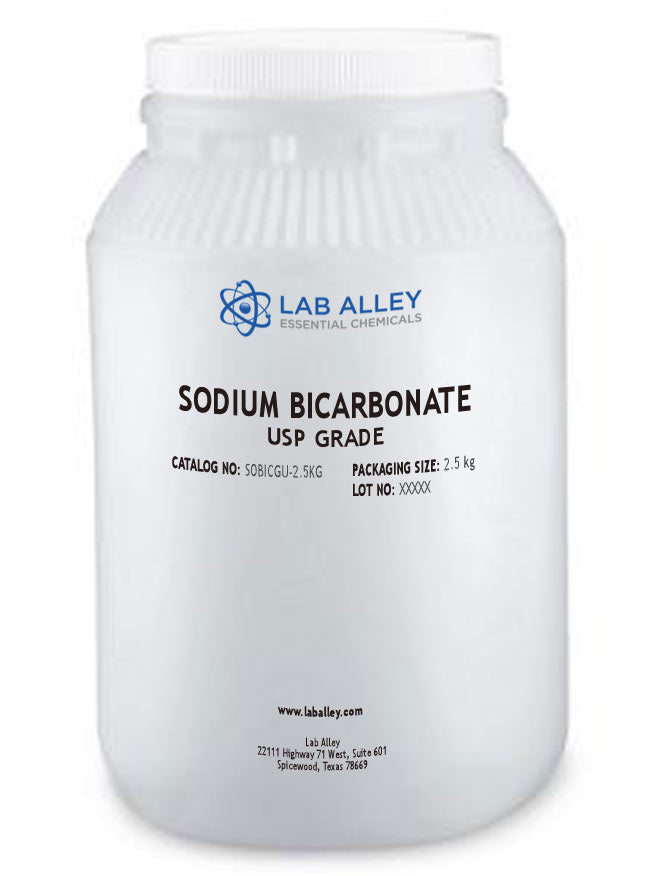Shelf Life & Expiration of Sodium Bicarbonate
Sodium bicarbonate (NaHCO₃), or baking soda, is a reliable and widely used chemical with applications in food processing, pharmaceuticals, cleaning, agriculture, and laboratory science. While it is known for its chemical stability and low reactivity, sodium bicarbonate is not indefinitely effective. Over time - and especially under improper storage conditions - it can lose its potency and functionality. Understanding its shelf life, how to identify expired product, and how to properly store and replace it is essential for maintaining safety, compliance, and product integrity.

In this article, we’ll explain:
1. How Long Does Sodium Bicarbonate Last?
2. Signs That Sodium Bicarbonate May Have Expired
3. What to Do If It’s Expired
4. How to Extend Shelf Life
How Long Does Sodium Bicarbonate Last?
Sodium bicarbonate is considered a stable compound, especially when stored correctly in sealed containers. It doesn’t spoil in the way that organic compounds do, but its performance can degrade as it slowly transforms into other compounds such as sodium carbonate, particularly in the presence of moisture, heat, or air.
In ideal storage conditions - cool, dry, and sealed packaging - food-grade or pharmaceutical-grade sodium bicarbonate can remain effective for 2 to 3 years or longer. The actual shelf life varies depending on purity level, exposure to environmental factors, and whether it’s stored in bulk or retail packaging.
Factors that influence shelf life:
- Chemical Stability: While inherently non-reactive, sodium bicarbonate may decompose gradually in humid or warm environments.
- Packaging Quality: Airtight, moisture-resistant packaging prolongs usability; poorly sealed containers accelerate degradation.
- Storage Conditions: High humidity, fluctuating temperatures, or contamination can cause loss of leavening power or buffering capacity.
Signs That Sodium Bicarbonate May Have Expired
Even when it appears physically intact, sodium bicarbonate can lose its effectiveness. This is particularly important in critical applications such as food preparation, pharmaceuticals, and laboratory procedures, where accuracy and reactivity are essential.
Visual inspection and performance testing can help determine whether the compound is still usable. In some cases, discoloration or clumping is an immediate indicator of compromised quality.
Indicators of expiration include:
- Color Change: The compound should remain bright white. Yellowing or discoloration suggests contamination.
- Clumping or Hardening: Moisture exposure may cause caking or crystallization, affecting solubility and dispersibility.
- Unexpected Pressure: Rare but possible if sodium bicarbonate is sealed with acidic residues, which may cause CO₂ buildup.
- Decreased Effectiveness: In baking, expired product won’t produce a proper rise. In lab use, it may lead to inaccurate pH readings or failed reactions.
For food use, a simple performance test involves adding a small amount of vinegar. If the mixture bubbles vigorously, the sodium bicarbonate is still active. If not, it’s likely time to replace it.
What to Do If It’s Expired
When sodium bicarbonate reaches or exceeds its shelf life, or shows any signs of degradation, it’s important to handle it properly - especially in commercial, scientific, or regulated environments.
1. Check Manufacturer Guidelines
Many suppliers of USP, food-grade, or ACS-grade sodium bicarbonate include a shelf life or “retest by” date. These grades may be eligible for requalification through analytical testing. Always refer to the product label or the certificate of analysis (COA) to determine whether retesting or replacement is required.
2. Follow Proper Disposal Protocols
Sodium bicarbonate is generally non-toxic and environmentally safe, so small quantities can be disposed of down the drain with plenty of water. However, industrial and laboratory users should comply with local EPA, OSHA, or wastewater authority regulations, especially if the material is contaminated or mixed with other compounds.
3. Replace with Fresh Stock
Expired sodium bicarbonate can jeopardize the effectiveness of food products, scientific experiments, or pharmaceutical formulations. For all mission-critical uses, it is strongly recommended to discard aged or degraded material and replace it with a fresh, verified batch.
How to Extend Shelf Life
Maintaining proper storage conditions is the most reliable way to extend the usability of sodium bicarbonate. Even though it is chemically stable, external factors like humidity and contamination are leading causes of premature degradation.
Storage Best Practices:
- Use airtight, sealed containers to prevent moisture absorption and contamination.
- Store in a cool, dry environment away from heat sources and humidity.
- Avoid repeated exposure to air; open only when needed and reseal immediately.
- Keep away from acids and reactive chemicals, which can alter its composition or cause gas release.
For large-scale users, storing sodium bicarbonate in desiccated environments or controlled-access chemical storage areas can help preserve quality and reduce product loss.
Conclusion
Sodium bicarbonate is a long-lasting, low-risk chemical, but its effectiveness is not infinite. Whether you're using it for food, pharmaceuticals, cleaning, or lab applications, understanding its shelf life and knowing when to replace it is essential for performance and regulatory compliance.
By monitoring signs of degradation, consulting manufacturer specifications, and storing it correctly, you can ensure that sodium bicarbonate remains a reliable part of your process. When in doubt - especially in sensitive applications - fresh stock is always the safest choice.
For questions about testing, storage, or documentation, call the Lab Alley Customer Care team at 512-668-9918 or email customercare@laballey.com.
Where to Buy Sodium Bicarbonate
As your trusted partner in chemical supply, Lab Alley is always striving to meet the growing demands of our customers. We want you to be able to access all of your chemical needs in one place, along with streamlined online ordering and fast shipping.
Due to popular demand from our valued clientele, Lab Alley's Sodium Bicarbonate is available in a range of purities and packaging options to suit various commercial, laboratory, and personal needs.




